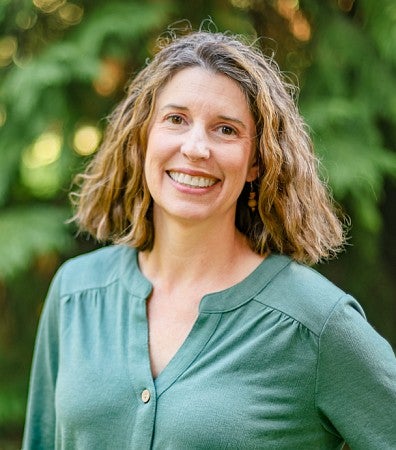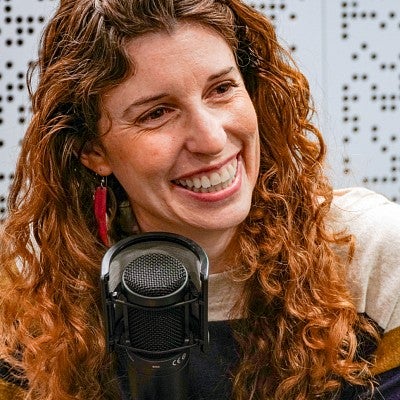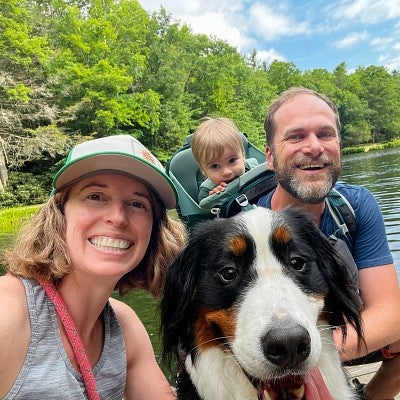
Karen McIntyre
Assistant Professor of Journalism
Hometown: I’m from Lake Tahoe. I’ve been living on the other side of the country for a while, but I’ve been wanting to get back to the West Coast.
Hobbies: Hiking, camping, going to breweries — stuff that leads to socializing.
Favorite author: My brother, Mike McIntyre. He’s published several books, but he made a name for himself when he published “The Kindness of Strangers.” He walked across the country without any money and wrote a book about his experience. I may be biased, but it’s a really good book and a fun read.
Favorite quote: “Things work out the best for those who make the best of the way things work out.” — John Wooden, former UCLA men's basketball coach
Favorite musical artists: I’ll give you four of my top artists: Sublime, The Grateful Dead, The Band and Taj Mahal.
Say “hello!”: Connect with Karen on LinkedIn or X and check out her website.
Karen McIntyre believes that journalism is a powerful tool for fostering change, and her research in constructive and solutions journalism is a strong testament to that belief. In her teaching role, McIntyre combines her passion for traditional reporting with her commitment to developing new approaches to how information is shared — offering solutions and hope alongside the important content. Her work often incorporates positive psychology techniques to create engaging journalism that steps away from the media’s negativity bias. She demonstrates that journalism doesn’t have to focus on only the problems of the world to be impactful; it can also uplift readers and give them hope by reporting on solutions that have worked for society’s problems.
McIntyre’s passion for reporting on social issues and how journalism interacts with such struggles is apparent in her long-term work in East Africa. Her research has explored how journalism developed from exacerbating conflict to supporting recovery and communities.
Returning to the West Coast after years of teaching and researching across the world, McIntyre is excited to build relationships within the SOJC community. She is dedicated to helping students explore socially responsible forms of journalism. Her goal is for students to walk away from her class able to recognize the impact of their work and how to responsibly approach that work.

McIntyre, in her own words, delved further into her career and projects.
What form of journalism do you work with the most?
Karen McIntyre: My main area is traditional reporting, writing and editing — the foundational elements of journalism.
Why did you decide to join the SOJC faculty?
KM: I had my eye on the SOJC because I feel like it's a really good fit in terms of my research and teaching interests. And I felt I would fulfill the school’s needs. I also have wanted to get back to the West Coast and be closer to my family for a while. So it was just a great opportunity.
What do you hope to accomplish at the SOJC?
KM: I want to continue my research and build relationships with faculty and students alike.
A lot of your past research focuses on “socially responsible” journalism. What inspired you to study that form of journalism?
KM: I first learned about those forms of journalism, sometimes called constructive or solutions journalism, during my doctoral program. A professor asked me to compile a list of “good” news, and I thought it was silly at first, but then I started to learn about it, and it just stuck. I care about journalism and believe it’s highly impactful, but it’s not helpful if we’re just making people feel depressed and hopeless. And I’m generally an optimistic person as well, so I think it was a perfect trifecta — me being passionate about journalism, seeing a way to improve it and being a positive person.
But as I’ve continued working with socially responsible forms of journalism, I’ve developed definitions for what, fundamentally, counts as constructive or solutions journalism. Constructive journalism is a broad term. I've defined it as an emerging form of journalism that involves applying positive psychology techniques to news processes and production in an effort to create productive and engaging coverage, while holding true to journalism's core functions. Solutions journalism is rigorous reporting on how people are responding to social problems.
For my dissertation, I created the news stories that I used in my experiments. I started with real stories but then manipulated them to control for specific variables. For example, the constructive version of the story would evoke positive emotions, and the nonconstructive version would evoke negative emotions. The solutions version would mention how people addressed a problem, and the conflict version would only discuss the problem itself.
As far as where to find such stories, it can be difficult because they are spread all over. But the New York Times had a blog series called “Fixes” that was all solutions journalism stories (it ended somewhat recently, though). De Correspondent is a Dutch news site that offers constructive news. The Guardian publishes a lot of constructive/solutions-oriented stories. And thinking more locally, The Seattle Times publishes solutions-oriented education coverage (they call it Education Lab).
You’ve also focused on African media. Why did you develop an interest in that region's media?
KM: I started by looking at Rwanda, as it’s a fascinating place to study media. Looking at how the media was used to exacerbate the Rwandan genocide in the 1990s compared to how it’s used now to help the country recover is fascinating and shows the diversity of journalism impacts. I had a fantastic experience going there and conducting research, which led to me going to neighboring countries and applying to live in Rwanda for a year as a Fulbright Scholar. In 2023, my work focusing on press freedom and journalistic practices in East Africa, specifically in Rwanda, Uganda and Kenya, culminated in publishing with coauthor Meghan Sobel Cohen “Press Freedom and the (Crooked) Path Toward Democracy: Lessons from journalists in East Africa.” I hope to continue my research while at UO and hope to bring my insights to classes such as International News.

Who have been the biggest influencers on your career?
KM: I would have to say two of my mentors in my Ph.D. program, Dan Riffe and Rhonda Gibson, have had the biggest impact on my career. Rhonda was my dissertation advisor. She cares deeply about her students, and she has always been a mentor. She has written me several recommendation letters for jobs, awards and for the Fulbright fellowship. She has given me career advice, including when I applied for this job! Dan Riffe has played a similar role in my life. He is someone I have gone to multiple times to talk through a research study. He helped me choose which offer to accept when I was on the job market. Both of these mentors were also my professors, and the lessons I learned in their classes still stick with me. They have shaped me into the researcher, teacher and colleague that I am.
Can you talk about some of your recent accomplishments?
KM: I’ve been a member of multiple research projects, and publishing my book was major. But since 2023, I’ve had a baby and took maternity leave, so I think that’s been a major focus for me and a big accomplishment!
What do you hope students gain from your classes?
KM: I hope that I can help students publish content they're proud of and give them important lessons and skills that will aid them for the rest of their lives.
What are three things you want students or fellow faculty to know about you?
KM: I think I have a reputation for being tough but fair in my classes. I have a one-year-old happy, silly little boy named Nolan. And I have a real sweet giant Bernese mountain dog. Oh, and a bonus, I guess, but I love traveling and loved my time in Rwanda.
—By Ethan Donahue, class of ’26
Ethan Donahue is a journalism major with a double major in history. He is part of the School of Journalism and Communication’s direct-admit and honors programs. He is also part of the Clark Honors College. He holds an interest in investigative and conflict journalism and is working on a thesis focusing on how journalism, propaganda and the U.S. government interact during conflicts.
